An interview with Prof. Zhiqiang Chen from Tsinghua University, Chairman, President and Chief Executive Officer, NUCTECH. By Ross Falconer
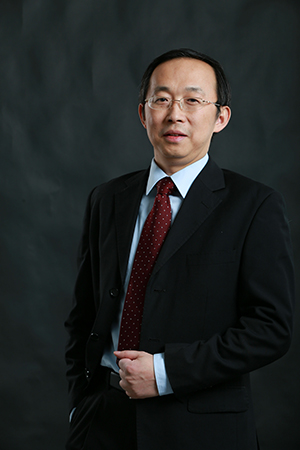
Prof. Zhiqiang Chen from Tsinghua University, Chairman, President and Chief Executive Officer, NUCTECH
For the aviation industry, COVID-19 proves to be one of the most defining moments of our time. In a few short months, it has disrupted airport operations, vacated airport facilities, dampened travel interests, and most important of all, profoundly changed our perception and expectation of our journeys.
As more and more countries start to reopen, global airports are looking for ways to reinstate their operations in a safe and secure way. In this new reality, it is critical to leverage state-of-the-art technologies to outmanoeuvre today’s challenges caused by the pandemic, including heightened hygiene standards, seamless health screenings and minimised human or surface interactions.
This article is the first in a series of pieces which talk about how technology could solve these problems. With these solutions, airports would be better positioned to guard the safety of travellers and staff, restore their confidence in flying, better align to the new normal, and thrive in the upcoming post COVID-19 era.
Improving hygiene standards by comprehensive disinfection
According to COVID-19 aviation recovery ‘Take Off’ guidelines, newly adopted by the International Civil Aviation Organization (ICAO) Council Aviation Recovery Taskforce (CART), it is recommended that cleaning and disinfection of terminal infrastructure and all equipment should be done on a regular basis and its frequency should be increased as required due to traffic. “To mitigate the spread of disease, disinfection has become a crucial step to deliver a safe environment for both passengers and staff around the airport,” explains Prof. Zhiqiang Chen from Tsinghua University, Chairman, President and Chief Executive Officer, NUCTECH.
Disinfection with UVC systems to protect the security checkpoint
Along the passenger journey, a unique challenge is the high contact nature of the screening process, with frequent close interactions between passengers and interfaces of baggage trays. “A study from Finland’s National Institute for Health and Welfare uncovers that the tray used in the security checkpoint is the place containing the most germs and viruses at the airport,” says Prof. Chen.
Since the trays are repeatedly contacted by people and personal items in a setting with limited options for rapid decontamination strategies, airports need innovative solutions to reduce the risk of virus spreading.
“With years of successful application in medical facilities, water treatment facilities and other high standard areas, the ultraviolet-C (UVC) technology proves to be ideal for rapid decontamination, delivering promises that pathogens could not develop a natural resistance to it,” Prof. Chen explains. “As a world leader in airport security, NUCTECH introduces its innovative UV-C Tray Disinfection Module, specially designed for cleaning trays at security checkpoints. The new solution can deliver high doses of UV-C light and eliminate 99.99% of viruses and bacteria attached on trays automatically.”
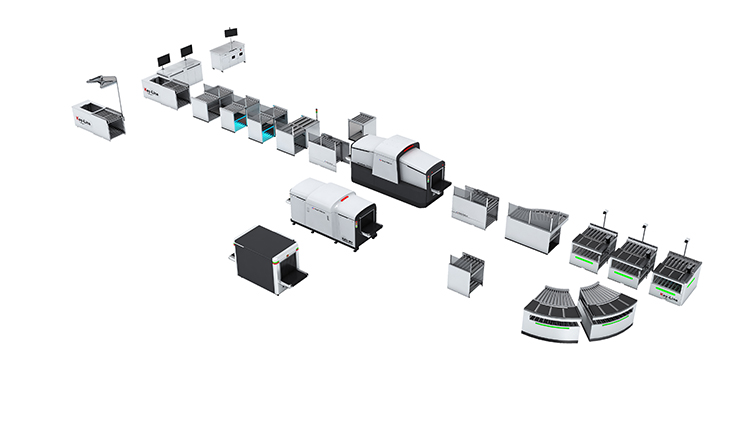
NUCTECH’s innovative UV-C Tray Disinfection Module is specially designed for cleaning trays at security checkpoints. The new solution can deliver high doses of UV-C light and eliminate 99.99% of viruses and bacteria attached on trays automatically.
The module can be easily integrated with tray return systems, with no additional space required and no further delay of the screening process. Trays can be sterilized during the process of transportation, making sure they are clean for reuse when they come to the passengers. Standalone configuration is also available for checkpoints to accommodate different settings.
“Furthermore, by integrating a UV-C light disinfection component into a checkpoint management system, system status could be monitored automatically and preventative maintenance could be scheduled proactively,” Prof. Chen adds.
Keeping the safety of travellers in mind, the system utilises coverings to block the UV-C lights from leakage. The module also meets the ISO 15858:2016 international safety standard. In case of any emergency stops, tunnel blocking or unauthorised opening, the UV-C lights would be shut down automatically by interlocks.
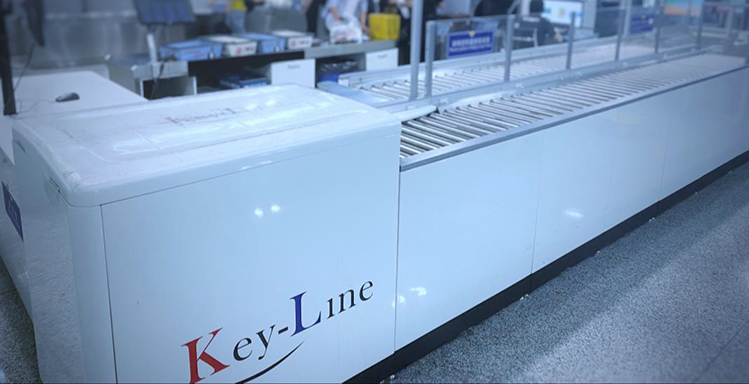
NUCTECH’s Key-Line UVC Tray Disinfection module provides every passenger with a clean and freshly sanitised tray, allows them to pass through the checkpoint quickly, and reinforces their confidence in flying from the airport.
“Up to now, NUCTECH’s Key-Line UVC Tray Disinfection module has been deployed in an airport located in southwest China since March 2020, enabling the airport to disinfect baggage trays in a safe, fast and cost-effective way,” Prof. Chen explains. “It also provides every passenger with a clean and freshly sanitised tray, allows them to pass through the checkpoint quickly, and reinforces their confidence in flying from the airport.”
Disinfection with robots to protect the airport environment
Considering the multiple touchpoints beyond the checkpoint, it is imperative to take on additional measures to promote the hygiene standard in other public areas, such as payment terminals, staircase rails, check-in counters and other interfaces between travellers and the airport environment.
“However, typical disinfection at public areas always entails a dedicated team with extensive training and cumbersome protective gear to take on repetitive and arduous sterilization all around the clock,” says Prof. Chen.
Considering the shortage of staff during COVID-19, it poses great operational challenges for airports. In addition, due to the high frequency of usage of public areas, the cleaning team can be overwhelmed by the manual disinfection and inconsistent performance might be resulted. Moreover, the scene of a team of workers with biohazard clothing walking around the airport may be quite intimidating for some passengers, which might build up anxiety and distrust.
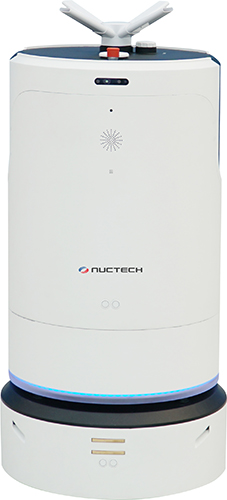
iGuardTM disinfection robot is a newly-developed mobile disinfection system by NUCTECH.
“In light of this, iGuardTM disinfection robot, a newly-developed mobile disinfection system by NUCTECH, could be an ideal solution,” Prof. Chen comments. “Compliant with health and safety requirements, iGuardTM can disinfect the air and interfaces within its broad reach, ensuring a quick disinfection process with great efficiency.”
Large quantities of disinfectant could be mounted onto iGuardTM to enable a long-time sterilizing journey around high touch areas at off-peak hours. Equipped with a large container of 15L, it could cover 750m3 in a single run, or 1,800m3 an hour for an open area with the disinfection fog and mist.
“As a tireless robot, iGuardTM is capable of long working hours with steady performance,” says Prof. Chen. “It is easy to operate and can be automatically recharged after finishing routine disinfection. Capable of 24/7 services, it can operate automatically with only a few operators needed to supervise the fleet.”
Another big strength is about the look. In the digital age, a quiet, diligent and sleek robot is always a pleasant sight to ease passengers and staff alike. “With its appealing aesthetics and user friendliness, it is instrumental to restore passenger confidence not only about the hygiene standard, but also the feel of the airport, leaving a possible good impression to impact their future travel choices,” says Prof. Chen.
To mitigate spread of the virus in an airport setting, the disinfecting robot can effectively sterilize the high-touch areas with fog and mist, alleviate the burden of staff by automating the repetitive disinfecting work, saves more human operators for other irreplaceable tasks, and greatly improves the hygiene standard of public areas in a more efficient and effective way. “During the pandemic, innovative robotic solutions, such as iGuardTM, are quickly picking up momentum with trials showing positive feedbacks from office buildings, hospitals, and some pioneer airports around the world,” Prof. Chen explains.
Disinfection of personal items to protect airport staff
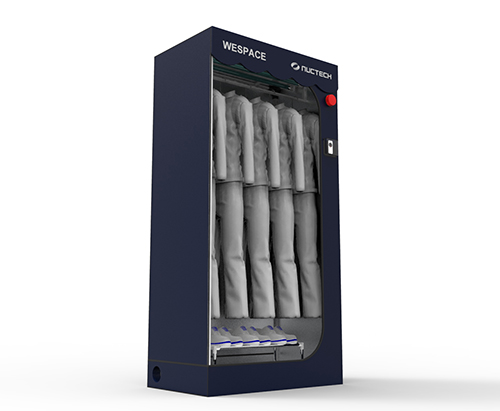
Using UV-C light disinfection technology, the NUCTECH WESPACE Uniform Disinfection Cabinet provides airport staff with an efficient method to clean their uniforms, shoes and other personal items in a safe and convenient way.
In high footfall places like airports, the safety of staff is always of high priority during a public health crisis. Clothing like uniforms, protective gear, and frequent tools, are constantly used in public spaces with great exposure to contamination.
Using UV-C light disinfection technology, the NUCTECH WESPACE Uniform Disinfection Cabinet provides airport staff with an efficient method to clean their uniforms, shoes and other personal items in a safe and convenient way. Prof. Chen adds that, with a small footprint and easy assembly, the disinfection cabinet can be quickly installed to keep and sterilize those items, allowing them to be reused safely by staff.
“To bolster the restart of aviation post COVID-19, we believe a heightened hygiene standard has become one of the priorities for airports to safeguard their operations and restore passenger confidence. With advanced disinfection solutions in place, airports are capable of delivering a safe screening experience, a clean public environment, and necessary protection for their workforce.”







